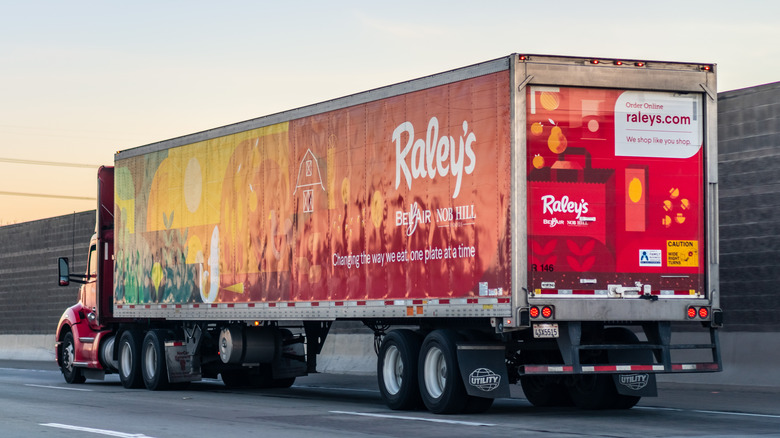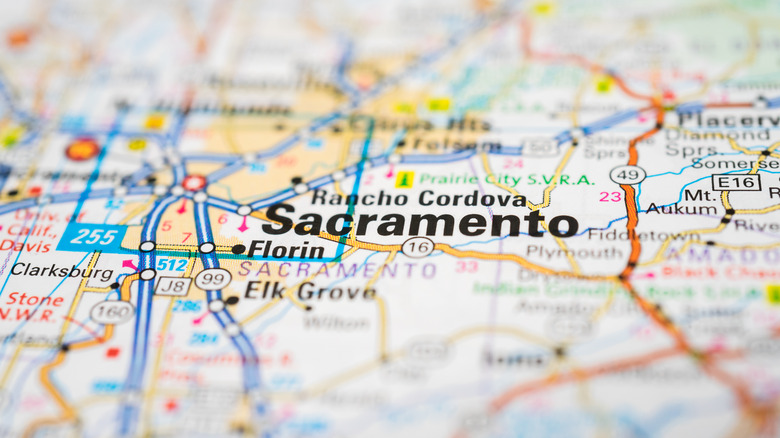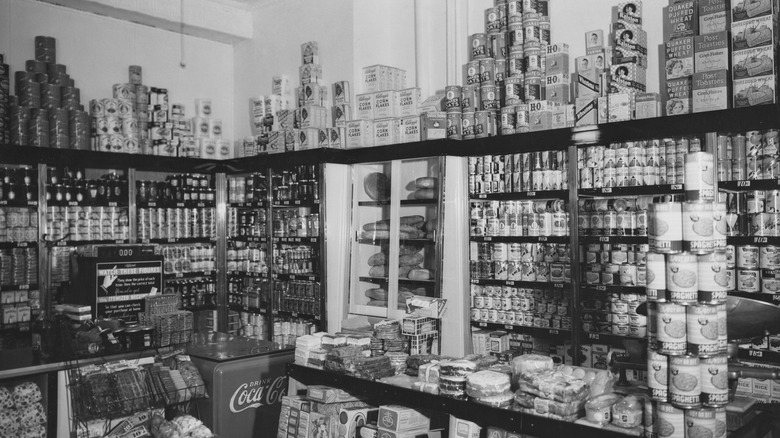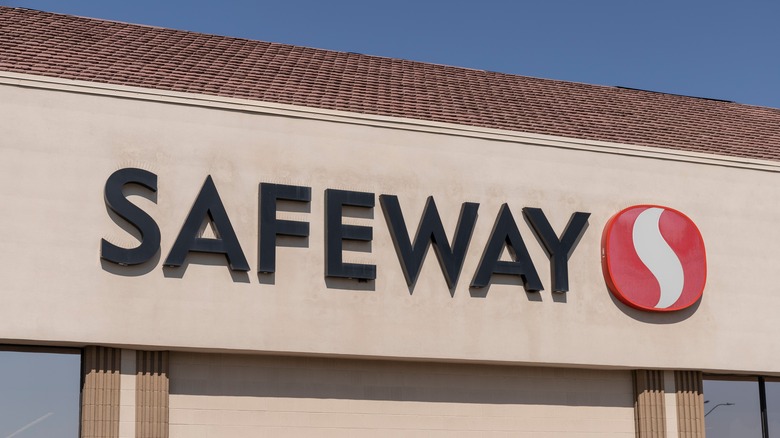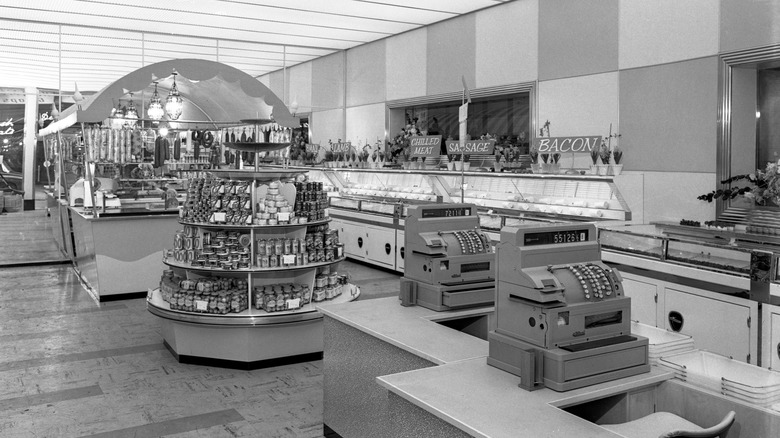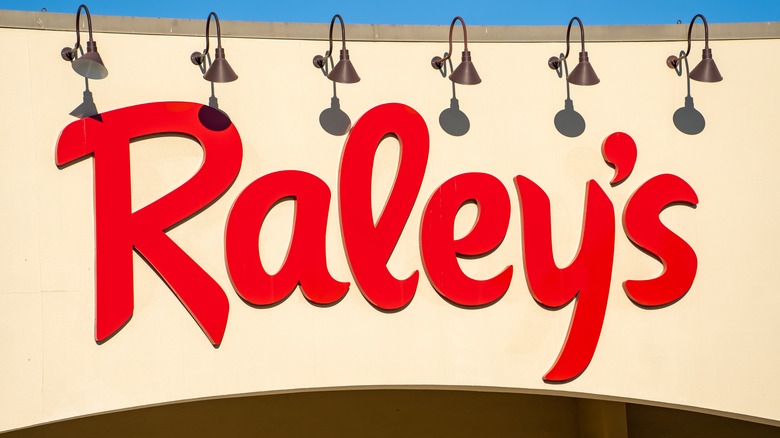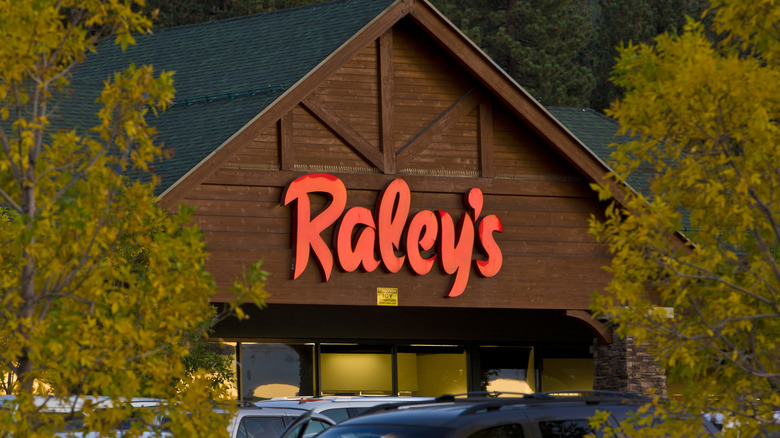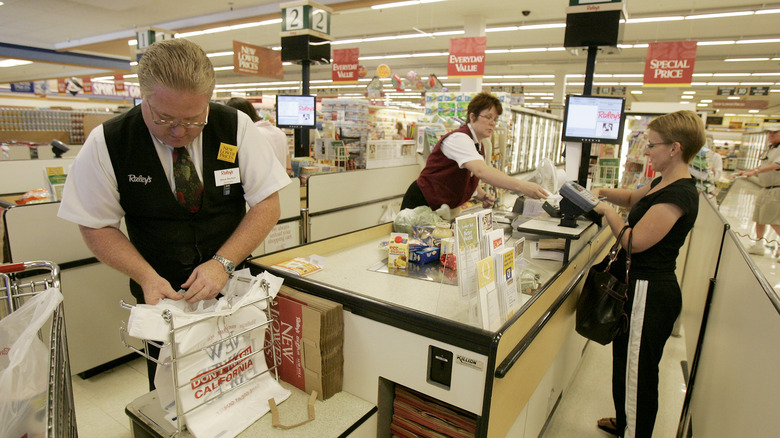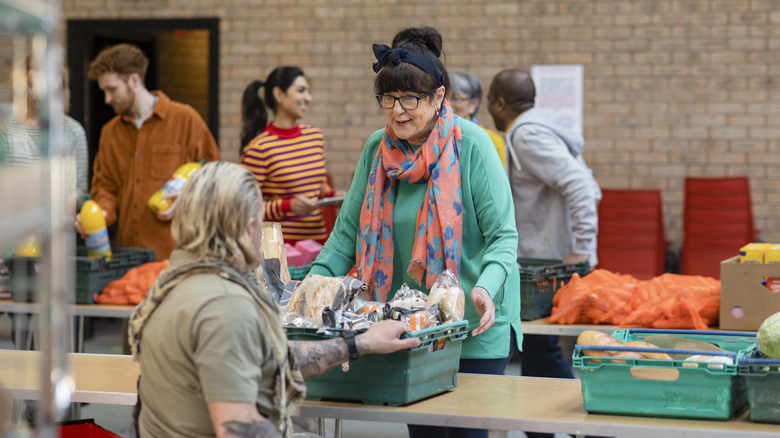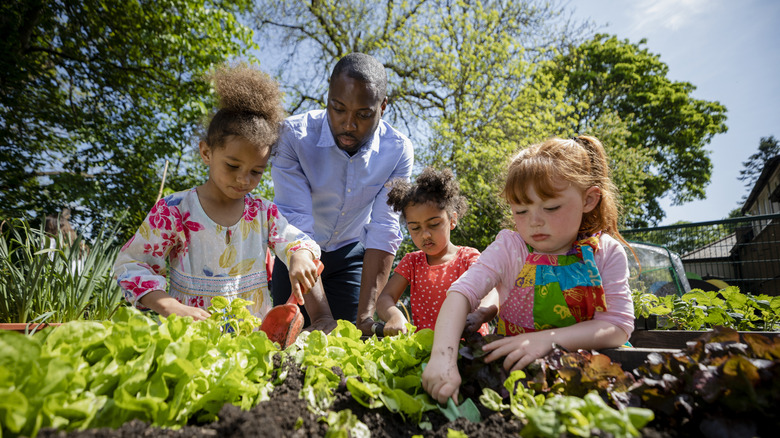What You Should Know About Raley's Supermarket
The only bad thing you can seemingly say about Raley's corporation is that they're not everywhere. The third-generation-owned family business is located in Northern California and Nevada, with its headquarters in Sacramento. Once known for being the nation's first meat market at its sole location in Placerville, California, Raley's has grown to include many different umbrella markets, like Nob Hill and Slater Bros. Market, among others.
It might be considered a smaller chain when compared to corporate supermarket giants like Safeway or Walmart, but Raley's makes a big impact on its surrounding communities, with its plethora of altruistic endeavors and the millions of dollars it gives back every year. From classroom programs to educational grants to food hunger relief efforts, the company is relentless in giving back to local communities.
The only dirt we were able to dig up on the grocer was perhaps a few disgruntled employees letting off some steam on Indeed, but that's not to say there weren't happy ones there too. All in all, we found pretty cool reasons to shop at Raley's if you find yourself in the Northern California or Nevada region.
Raley's is based out of Sacramento, California
Located in the state capital of California in Sacramento, Raley's opened a new flagship store in April 2020, in the midst of Covid. The store wasn't able to host a grand opening event due to the pandemic, but the soft opening did provide Raley's shoppers with a second location in West Sacramento to safely shop during the unsettling Coronavirus. The store serves as the new crown jewel of Raley's locations and is situated near the Land Park community of West Sacramento. The landmark store also pays homage to the supermarket's iconic history by preserving architectural design elements through its signage as well as small interior touches that symbolize the region's history.
The new flagship store is right around the corner from Raley's corporate offices in West Sacramento, which has served as the company's headquarters since 1984. The company was originally advertised as the nation's first drive-in market, which was considered a revolutionary concept at the time of its launch in 1935.
The first Raley's opened in 1935
Raley's has been around for nearly a century, having opened its first store in February 1935 in Placerville, California, just outside of Sacramento. With only $121 of investment money to put towards the new grocery store, Tom P. Raley was able to hire a contractor to build a 2,500-square-foot building. When construction was finished, Raley had run out of money and wasn't able to stock the shelves, and had to rely on credit to get his new grocery business up and running.
In the midst of the Great Depression, the company still managed to turn a profit of $4,500 during its inaugural year, which was a considerable sum given the hard times. Marketed as "the nation's first drive-in market," the new grocery retailer gained a fast following of shoppers thanks to the high-quality meat and produce available at the new Raley's. However, the start of World War II caused a major rift in the supply and demand of meat, produce, and dairy products, and Raley's profit margin, as well as supermarkets across the country, took a dip in sales. The company came back stronger than ever post-war with the introduction of packaged foods.
Raley's was founded by Tom P. Raley
Born in 1903 in Arkansas, Thomas P. Raley left his home state shortly after graduating high school to travel west in pursuit of prosperity and a better life. Landing in Los Angeles, California, Raley immediately started working in the grocery industry as a water delivery man, as well as a filing clerk. That was until Raley caught the eye of M. B. Skaggs, president, and founder of Safeway grocery stores, who offered Raley a position at his up-and-coming grocery chain. In just over one year, Raley climbed the grocery store ladder to become a manager at Safeway, launching him into a lifelong supermarket career.
When it came time to part ways with Safeway and launch his own market, Skaggs helped make it happen by financially backing Raley so he could make his new business venture a success. Raley was the sole owner of Raley's up until his death in 1992. He died peacefully in his home at the age of 88 after complications from a stroke. Raley is remembered not only for pioneering the Raley's chain of grocery stores but also for the role he played in incorporating Sacramento and supporting the West Sacramento communities through charitable donations and building projects.
Raley's opened the nation's first self-service meat counter in 1947
Fresh off the Great Depression and World War II, Raley's remained open, and even made a comeback post-war with the introduction of packaged and processed foods. In spite of the convenience packaged items brought to supermarkets and home cooking, Tom P. Raley was determined to stock his shelves with healthier options like fresh produce in meat.
In 1947, Raley decided to combine convenience with freshness by opening the nation's first self-service pre-packaged meat counter. Prior to 1947, customers would order their meat through the grocery store butcher, and orders would be butchered based on specific sizes and cuts. Around that same time, plastic wrap was invented, creating a boom in the pre-packaged food and meat industry, with Raley's paving the way. Raley's became known as the first supermarket to introduce the concept, and the trend of self-service meat counters quickly spread across the United States, revolutionizing the meat industry and the way it was sold.
Raley's is a third-generation family-owned business
Tom P. Raley served as the sole owner of Raley's until his death in 1992, at which point he was still serving as chairman emeritus. His daughter, Joyce Raley Teel, was his only heir and had been serving as co-chair with her husband, James Teel. Joyce then became the second generation of Raley's family members to own and operate the company after Tom Raley's death. Of their five children (one boy and four girls), Joyce and Jim passed on majority ownership of Raley's to their son, Michael Teel, in 2015, and minority ownership to their four daughters.
When Teel took the reins in 2015, he became the third generation of family ownership, which marked a significant milestone as it has been recorded that fewer than 12% of family-owned businesses make it to a third generation of proprietorship. It also set Raley's up to become one of the largest companies in Northern California to maintain family ownership, and the Teel and Raley family hopes to continue that legacy for generations to come.
Raley's owns and operates 126 grocery stores in California and Nevada
Starting with just one grocery store in Placerville, California in 1935, Raley's has now expanded to 126 grocery stores regionally in Northern California and Nevada. The total number of stores includes 78 Raley's, 20 Nob Hill Foods, five Food Source stores, and one Sak N' Save. Of those stores, there are approximately 11,500 employees working for the family-owned company, which equates to about 100 employees per location. The company still boasts private ownership, and is one of the largest family-owned businesses in Northern California, with headquarters in West Sacramento.
Over the last few years, the company has continued to grow and expand, with the announcement of a new Raley's O-N-E Market opening in Truckee, California in 2020. The store takes Raley's commitment to health and nutrition to the next level with locally sourced produce, meats, and health-food items, with a layout and style that mimics Whole Foods. In 2021, Raley's signed an acquisition to take over Bashas' Family of Stores, which is regionally based in Arizona. There's no telling how far this company will grow and expand, but with a strong family-owned foundation and unstoppable acquisitions of other regional grocers, the sky's the limit for Raley's.
Raley's offers great benefits to employees
Raley's is an equal opportunity employer, with inclusion and employee respect being among its top values. The company also promotes employee longevity by offering leadership training programs and courses in management in order to promote within and encourage employees to move up the career ladder. Raley's is also known for providing scholarships to its employees to help them and their families achieve their educational aspirations.
With an overall company focus on health and wellness, Raley's also strives to provide a safe work environment in post-pandemic times. The company offers health benefits, counseling services, wellness education programs, and in-house registered dietitians for all staff.
The job isn't always glamorous, and like any company, there are going to be disgruntled employees who report long hours, tedious work, and mediocre pay. According to Indeed, there's a mixed bag of reviews from current and former staff of Raley's, some boasting quality coworkers and strong management teams, while others report lackluster job duties and disappointing schedules.
Raley's provides meals to local families in need
Raley's is on a mission to help end hunger for local families in need in the greater Sacramento area, as well as other cities and towns in Northern California, and Nevada through its nonprofit organization, Food for Families. The charity has been around for almost 40 years, and in that time, it has raised over $59 million dollars equating to about 44 million meals.
Founded by former Raley's president Chuck Collings and former owner Joyce Teel Raley, the 501(c)(3) organization is partnered with Feeding America, which is the leading charity in ending food hunger in the U.S. The partnership enables Raley's to reach as many communities and families as possible through food banks, hunger relief programs, and year-round food drives.
Raley's collects donations through Facebook marketing campaigns, at store checkouts, and through the company's holiday drive, which generates the largest amount of donations every year. During the 2020 holiday donation season, it raised a staggering $3 million, which was the largest number of donations raised during the annual holiday fundraiser to date. Raley's offsets the administration costs associated with running the nonprofit to ensure all proceeds reach those in need.
Raley's is committed to nutritional education for customers
Since its inception in 1935, Tom P. Raley was committed to stocking his shelves with farm-fresh produce, local meats, and nutritious, wholesome foods. That legacy continues to this day with fresh, local offerings, as well as through the array of educational programs designed to provide transparency and access to information about the products customers are purchasing.
With so many options on every aisle and shelf in grocery stores today, Raley's has implemented a shelf guide to help consumers make better choices, and educate themselves on labels, ingredients, and products before they buy them. The Shelf Guide program helps shoppers easily identify what ingredients, nutrients, and processing are involved in each product so they can make smarter decisions to accommodate their individual needs. With color-coded stickers and easy-to-identify icons, the coding is designed around food industry research and the latest trends in health and wellness. Factors Raley's considers when coding packaged products include sugar, sodium, and fiber content, as well as how processed each item is.
Raley's took their commitment to nutritional education, health, and wellness to the next level in 2020 with the launch of Raley's O-N-E Market in Truckee, California. With a focus on organics and sustainability, the O-N-E Market represents the ongoing evolution of Raley's and places the company at the forefront of health and nutrition in the grocery store industry.
Raley's gives out extra credit grants to schools
As part of the company's ongoing efforts to educate their surrounding communities, as well as give back to those in need, Raley's offers extra credit grants to K-12 schools to help support nutrition, exercise, and food insecurity programs.
The extra credit grants program accepts applications twice per year, once during fall and once during spring, and the amounts awarded are based on the size of the school, the needs assessed in the grant application, and the anticipated capacity of the proposed program or project. Submissions may be made through Raley's online portal during the open enrollment periods.
Past projects that grand funds have supported include health and safety curriculums, personal protective equipment, student-run gardens, improving school lunch programs, physical activity programs, increased access to fresh drinking water on school campuses, and distance learning supplies. Other programs that have been funded, but are outside the norm for the grants program include individual scholarships, food hunger relief efforts, school field trips that are focused on nutritional education and physical fitness, and other types of fundraisers or events that benefit local school communities.
Raley's has taught over 32,000 students about nutrition and agriculture
Raley's really is the grocery store that keeps on giving. As part of Raley's umbrella of corporate philanthropy, the company has educated over 32,000 students on nutrition, sustainability, and agriculture through its reputable Taste and Teach program in partnership with the California Department of Agriculture and Stater Bros. Markets.
After filling out an application, qualifying K-12 teachers receive academic information regarding California-grown produce and nuts. Classrooms are also given a $100 gift card to spend at any one of Raley's participating locations including Nob Hill and Bel Aire Markets on fresh produce to taste and discuss. Part of the overall message is to teach students where their food is coming from, the importance of sustainable farming practices, and ways to enjoy healthy, nutrient-dense foods.
The Taste and Teach website also provides access to an online portal of classroom resources like tasting worksheets, classroom materials, and educational information. Through this altruistic program designed to support food education, Raley's has reportedly given back over $10 million to local communities.
In 2022 Raley's won the Produce Business Retail Sustainability Award
For all that Raley's has given back over the years in nonprofit donations, it seems only fair the company receives an award every now and then. More recently, Raley's was the proud recipient of the Produce Business Retail Sustainability Award in 2022 based on their holistic approach to green business practices.
The award comes two years after Raley's opened its bougie, upscale Raley's O-N-E Market just outside of Lake Tahoe, California. The evolutionary commitment to healthy, nutritious food, educational outreach, and general layout and offerings in the store, caught the attention of Produce Business Magazine, who later named Raley's the award recipient.
Some aspects of Raley's business model that were noteworthy included its commitment to labeling certain sugars, fats, and processed ingredients on every price tag in the store using its system of colorful icons. Produce Business also gave a nod to its non-GMO efforts and the support of sustainable seafood and meats.
Raley's offers free fruit to kids while parents are shopping
Among the sweet, satisfying, and mouth-watering things that Raley's does to promote health and wellness with its customers is give away free fruit to the kiddos while their parents are shopping. Not only does this give kids something to enjoy while shopping, but it also helps introduce and promote trying a variety of fruits for those little expanding palates.
The initiative was launched in 2016, shortly after Raley's launched its "Let's Begin Campaign," when baskets were placed at the entrance of the store to connect fruit with kids and allow anyone under (roughly) the age of 12 to pick out their own piece of fruit on the house. The initiative also falls under Raley's umbrella of outreach and education by giving kids a taste of California-grown produce. This additional way of giving back helps support Raley's overall mission to empower the general public to make healthier, more sustainable choices with their food.
